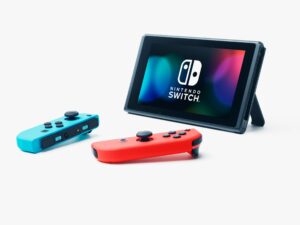What can news publishers learn from the success of the Nintendo Switch?
Modern media, to some extent, is just a series of stunts and marketing materials.
News publishers have to compete with digital outlets who, by nature of the race to scale, sell their content with hyperbole and screaming rhetoric of the sort we used to call ‘clickbait’. Even BuzzFeed, whose news wing is consistently breaking some of the biggest stories of any given week, used to indulge in this.

Consequently even the legacy publishers find themselves dragged further towards that hysterical drive to be noticed. Take The Atlantic, the US-based publication whose work and business model other publishers look upon with envy. Last month, it appointed the arch-conservative columnist Kevin Williamson, as a stunt intended to broaden its appeal, though it was dressed up as an attempt to provide balanced coverage. Unsurprisingly, Williamson was let go very shortly afterwards, as his radical religious views were discovered.
Closer to home, the UK’s Evening Standard recently made an awful lot of noise about a rebrand that turned out to be style over substance. Its editor George Osborne (whose hiring was itself a stunt) ensured that the paper’s sudden inclusion of the poop emoji in the weather forecast would receive coverage from the press, presumably to try to prove to audiences the title is still vital and worth advertising spend.
(The Standard’s redesign is especially puzzling. The design changes were so small, and the changes to editorial content so bizarrely self-contradictory that I half suspect it’s a media version of the New Coke conspiracy, so when Osborne is out and the next editor reverts the changes the title gets more attention again.)
Those are two recent examples, but the media industry is rich with similar stunts, designed to attract audience attention in a digital age. Only the staid, subscription-based and secure brands like The Economist, The New Statesman and long-running B2B periodicals have found themselves largely immune from that drive. And ultimately, because of the din created by all that attention-seeking behaviour, each and every attempt largely gets lost in the noise. It’s a self-defeating strategy that leads each publication to iterate on a stunt to diminishing returns.
It isn’t a problem that’s limited to the news business, either. In the world of comics publishing, Marvel’s print division is constantly making noise about reboots and relaunches, stunts designed to counter the gradual slide of its market share. And since it keeps doing it, to mixed response, you have to suspect it isn’t working.
Perhaps the ultimate non-news media example of the past few years comes from video game company Nintendo – and it’s from that example that smart publishers can potentially learn a lesson.
After the blockbuster success of its home console the Wii back in 2006, Nintendo was in an extremely healthy place. The console was underpowered compared to its rivals Microsoft and Sony’s consoles, but its strong USP of motion control and some smart branding ensured that it was until recently the fastest-selling console in US history.
When, in 2012, Nintendo decided to launch a new console, it was an objective failure. The Wii U’s branding was confusing, causing many consumers to think the console was yet another peripheral for the ageing Wii. Instead of the strong marketing message of the Wii, Nintendo opted for attention-grabbing stunts to market the product.
As a result, Nintendo decided to launch a hybrid home and handheld console in 2017, many years before the typical console cycle demanded. This time, its marketing material showed again and again the main USP of the Switch, and built its advertisements around demonstrating that. It was a return to a non-gimmicky, audience-led console, and the marketing reflected that without the need to resort to stunts. The central marketing message – that it is both a home and handheld console – is reasserted in every bit of branding and promotional material it puts out. Consequently, the Switch has overtaken the Wii as the fastest-selling console in US history.
The parallels to the publishing industry are apparent: Nintendo has reasserted itself as the purveyor of a quality product, just as news publishers are attempting to do. And just like the best of them, it is doing so through smart, simple messaging, without resorting to gimmickry.
Martin Tripp Associates is a London-based executive search consultancy. While we are best-known for our work in the TMT (technology, media, and telecoms) space, we have also worked with some of the world’s biggest brands on challenging senior positions. Feel free to contact us to discuss any of the issues raised in this blog.